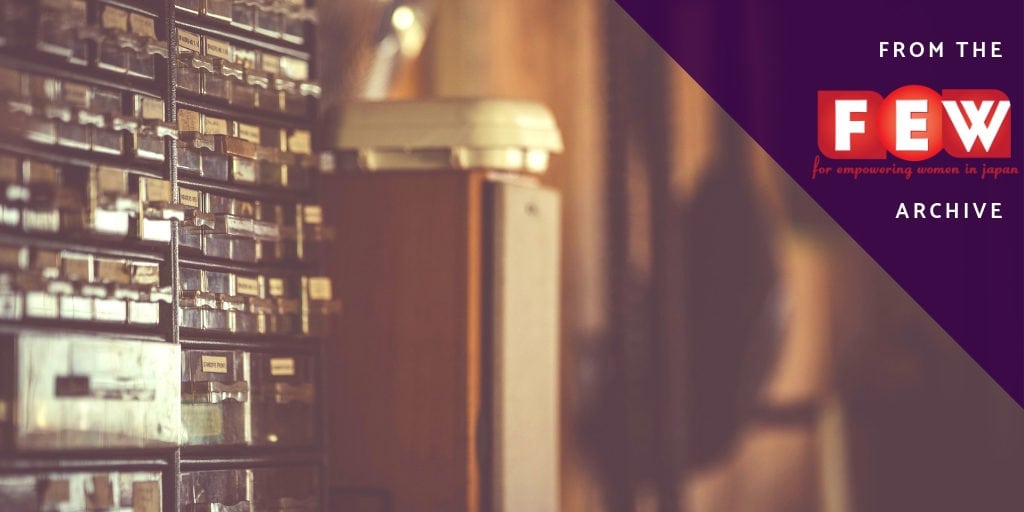February 2016 Meeting Recap: Making a Difference to Individuals and Communities

By Marie Mortreux, PR & Communications Intern
FEW’s February 2016 meeting introduced two Community Service Strategic Partners who take an active role in helping communities throughout Japan: Mirai no Mori and Second Harvest Japan. Vice Chair Jeff Jensen and Program Director Kozue Oka spoke on behalf of Mirai no Mori and Mana Nishioka represented Second Harvest Japan. The panel was moderated by FEW member Sarajean Rossitto, who is also a member of the board for Mirai no Mori.
The first presentation came from Mirai no Mori, an organization which aims to help underprivileged children at risk of becoming socially marginalized due to poverty or instability at home. They offer outdoor adventures camps for children from the first to twelfth grade to help these children learn English, develop practical skills and become more socially adjusted. Oka explained the children helped by Mirai no Mori lack good role models and financial wellbeing, often resulting in homelessness and/or recruitment into the crime or sex industries, illustrating the need for greater exposure to different possible career paths. Mirai no Mori’s programs are conducted in English, which gives the children a valuable tool for interacting with people from different parts of the world and for work purposes later in life. The children get the opportunity to interact with foreigners and can create close and lasting ties with members of the organization. For the team at Mirai no Mori, the confidence these children develop through camp is an immense source of satisfaction.
Nishioka spoke next about Second Harvest Japan, beginning by explaining the power of food and our association of food with happy events and memories. Although Japan is an economically well developed country, 2.3 million people lack of food security while millions of tons of food go to waste every year. Second Harvest Japan aims to provide food for those in need such as single parents, refugees, children and the homeless. The organization distributes food in four different ways: The Food Bank provides services from business to agencies; the Harvest Pantry distributes food directly to individuals; the Harvest Kitchen provides a distribution of hot meals at Ueno Park each Saturday; and Second Harvest Japan delivers food to those unable to collect food due to location, age or disability. Nishioka explained there are many “invisible” individuals in need, denoting a need for expanding the food banking sector. These individuals are considered invisible because they’re often ashamed to disclose their real economic situation.
These interesting talks were then followed by a question-and-answer session that allowed Mirai no Mori and Second Harvest Japan to further explain their needs going forward. Here are some of the most important facts about these two NPOs:
Mirai no Mori
- Children who take part in these programs have special needs and require deeper attention. The staff is thoroughly trained and children are often accompanied by their own care worker.
- There are around 600 orphanages in Japan housing children who could benefit from this program. The number increased considerably after the 2011 earthquake and tsunami.
- Children who don’t have any family to go visit during the summer months are given priority for attendance and Mirai no Mori encourages the same children to return annually.
- The average cost to send one kid to camp for five days is between 100,000 and 120,000 yen, paid for entirely by the organization thanks to contributions and occasional grant money.
- Mirai no Mori has NINTE status, which means donations are tax deductible, a status only 2 percent of NPOs in Japan have.
- Mirai no Mori remains in a need of investors who believe in its potential and can help it develop and grow.
Second Harvest Japan
- All the food Second Harvest Japan hands out is unexpired. Packaging may be damaged, but the food is still safe to eat.
- Second Harvest Japan is in need of locations to distribute food. These can be schools, churches, businesses, etc.
- Adults as well as children aged 12 years and older can volunteer with Second Harvest Japan. A great way to get children involved is to plan a food drive through their school.
- Second Harvest Japan is in need of volunteers to help with food distribution and donations of food to help those they serve cook balanced, healthy meals.
FEW values the importance of supporting organizations who don’t yet have all the necessary means to fulfill the needs of the communities they target. Mirai no Mori and Second Harvest Japan are two wonderful organizations we’re proud to work with and hope to see continue to grow, allowing them to help more people.
The challenges faced by Second Harvest Japan and Mirai no Mori are present but there are many opportunities the FEW community can help. Whether it is through volunteering, networking or funding, we can all make a difference.
